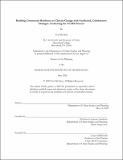| dc.contributor.advisor | Lawrence Susskind. | en_US |
| dc.contributor.author | McAlear, Zoë(Zoë Louise) | en_US |
| dc.contributor.other | Massachusetts Institute of Technology. Department of Urban Studies and Planning. | en_US |
| dc.date.accessioned | 2020-09-15T22:06:31Z | |
| dc.date.available | 2020-09-15T22:06:31Z | |
| dc.date.copyright | 2020 | en_US |
| dc.date.issued | 2020 | en_US |
| dc.identifier.uri | https://hdl.handle.net/1721.1/127619 | |
| dc.description | Thesis: M.C.P., Massachusetts Institute of Technology, Department of Urban Studies and Planning, May, 2020 | en_US |
| dc.description | Cataloged from the official PDF of thesis. | en_US |
| dc.description | Includes bibliographical references (pages 73-75). | en_US |
| dc.description.abstract | As communities around the world experience greater impacts from climate change, collaborative adaptation planning efforts are crucial to preparing for the future. This research examines one of these efforts, a pilot of the Vulnerability, Consequences, and Adaptation Planning Scenarios (VCAPS) technique by Western Water Assessment (WWA) at the University of Colorado Boulder across six communities in Colorado and Utah. The VCAPS process facilitates conversations amongst local decision-makers using collaboratively-built causal diagrams to understand how a hazard leads to specific outcomes and consequences, which correspond to potential points of intervention or actions. Using a survey and two series of interviews with participants, as well as documentation from the workshops, this research assists in the evaluation of WWA's six pilots. The questions guiding this research ask to what extent the VCAPS process better prepared the pilot communities to face their identified climate hazard(s), in terms of increased motivation, ability to overcome challenges or barriers to adaptation, and actions generated or influenced by the workshop. I find that these six pilot workshops demonstrate the potential of the VCAPS process to inform participants' understanding of their region's climate change risks and generate climate adaptation-related actions in their communities. At the same time, feedback and reflections from participants suggest various ways in which the process might be adapted for future iterations in order to respond to current challenges or limitations. I propose recommendations to address these, often relying on examples of other collaborative climate adaptation processes. | en_US |
| dc.description.statementofresponsibility | by Zoë McAlear. | en_US |
| dc.format.extent | 96 pages | en_US |
| dc.language.iso | eng | en_US |
| dc.publisher | Massachusetts Institute of Technology | en_US |
| dc.rights | MIT theses may be protected by copyright. Please reuse MIT thesis content according to the MIT Libraries Permissions Policy, which is available through the URL provided. | en_US |
| dc.rights.uri | http://dspace.mit.edu/handle/1721.1/7582 | en_US |
| dc.subject | Urban Studies and Planning. | en_US |
| dc.title | Building community resilience to climate change with facilitated, collaborative dialogue : evaluating the VCAPS process | en_US |
| dc.title.alternative | Evaluating the VCAPS process | en_US |
| dc.type | Thesis | en_US |
| dc.description.degree | M.C.P. | en_US |
| dc.contributor.department | Massachusetts Institute of Technology. Department of Urban Studies and Planning | en_US |
| dc.identifier.oclc | 1193557258 | en_US |
| dc.description.collection | M.C.P. Massachusetts Institute of Technology, Department of Urban Studies and Planning | en_US |
| dspace.imported | 2020-09-15T22:06:30Z | en_US |
| mit.thesis.degree | Master | en_US |
| mit.thesis.department | UrbStud | en_US |
